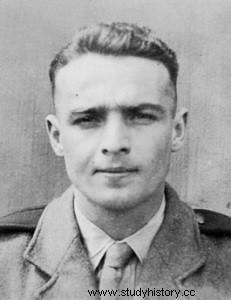
Édgard Tupët-Thomé , born April 19, 1920 in Bourg-la-Reine, is a French soldier, companion of the Liberation.
After obtaining his baccalaureate, he entered the Higher School of Catholic Theology in Reims. But having little vocation, he decided to enlist in the army. In October 1938, he preceded the call and was incorporated into the 8th regiment of Zouaves in Mourmelon. Promoted to sergeant, he was attacked in Lorraine in September 1939 and in Belgium the following year. He participated with his unit in the protection of the Dunkirk evacuation of the English expeditionary force from May 26, 1940 to June 3, 1940. He was taken prisoner on June 4, 1940 and escaped during his transfer to Germany on June 10, 1940. He was demobilized in September of the same year.
Wanting to continue the fight, he tries unsuccessfully to leave France, finds a job in Clermont-Ferrand, and circumstances make him meet Roger Warin, head of the "Ronald" network, of which he will become with Stanislas Mangin, one of his assistants. he is responsible for finding clandestine landing grounds.
Pierre Fourcaud, in charge of General de Gaulle's missions, came into contact in March 1941 with Roger Warrin. Tupët with Stanislas Mangin, Roger Warin, Gaston Tavian, and Maurice Andlauer, is the first secret military recruit in the Free French Forces.
Parachuted on December 9, 1941 in the Châteauroux region on a site he chose, he was accompanied by radio operator Joseph Piet. Injured in the head during the landing, he is in charge of mission, responsible for air operations and the "Action" branch of the "Ali-Tir" network, of which Stanislas Mangin heads the "Intelligence" branch. Immediate assistant to Mangin, whose departure he organized through Lysander in February 1942, Thomé worked as a 1st class agent. In April 1942 he made Gaston Tavian leave in the same circumstances as Mangin. Due to the injuries received six months earlier, he had to leave France in order to be treated. On May 29, 1942, on the occasion of the return from Tavian by a Lysander operation, Tupët-Thomé, accompanied by Philippe Roques, flew to England.
Promoted lieutenant, he benefited from a convalescence then, on his return to London, asked for his assignment in a combat unit. In November 1942, he left England for the Commando Instructor Detachment of Saint-Pierre-et-Miquelon, under the command of Stanislas Mangin. In February 1943, still with Mangin, he was assigned to the West Indies Detachment (then Battalion) of which he created and commanded the 2nd company which he trained until July 1943. In August 1943, Lieutenant Tupët-Thomé joined at his request the 4th Airborne Infantry Battalion (BIA) at Camberley and was commissioned as a paratrooper the following month. In January 1944, he was transferred as second in command of the 2nd company of the 3rd BIA, which in July 1944 became the 3rd SAS parachute fighter regiment (RCP).
With the 3rd RCP, he completed, in early August 1944, a first parachute mission in the region of Daoulas in Finistère. With his only section (12 men) he attacks a strong Kommandantur of 60 men, kills 12 Germans, takes 40 prisoners, repulses an enemy attack and liberates Daoulas. He then attacked the German garrison of Landerneau, inflicted heavy losses and liberated the town. He then joined the 6th American Armored Division for which he carried out several reconnaissance missions.
Edgard Tupët-Thomé parachuted a second time on August 27, 1944 in the Jura; he attacks and takes Clerval in Franche-Comté which he defends with 50 men against 27 enemy tanks and armored cars. He kills around thirty Germans and destroys a tank. He then joined the 7th American Army and, assigned to a divisional reconnaissance group, distinguished himself in particular at Arches during the passage of the Moselle. On September 23, 1944, he brought back under mortar fire a wounded American soldier in his lines.
Parachuted a third time in Holland on April 7, 1945, he carried out with his strong section of 15 men numerous attacks on the lines of communication inflicting serious losses in men and equipment on the enemy.
In 1945, he resigned from the Army. Admitted to the Colonial School of Administration, he was appointed Colonial Administrator in January 1946 in Tunisia and later became director of the Takelsa wine cooperative. He left Tunisia in 1950 for Canada and managed an agricultural property which he had acquired.
In 1955, he returned to France, resumed studies and became an engineer in scientific organization of work and joined Singer in the Technical Studies Office, then in a pharmaceutical laboratory in Neuilly-sur-Seine. From 1961 to 1965, he was an engineer at Panhard. Finally, he is the head of the agencies of a tourism company.
Decorations
Commander of the Legion of Honor
Companion of the Liberation1
War Cross 1939-1945 (6 citations)
Military Cross
King's Medal for Courage in the Cause of Freedom
Knight of the Order of Orange-Nassau
War Cross of the Netherlands
Writings
Special Air Service, the epic of a paratrooper in the occupied zone from 1940 to 1945, Grasset, 1980, 346 p.; reissue by Alain Bétry, Atlante, 2011, 250 p. (ISBN 978-2-912671-35-6)
